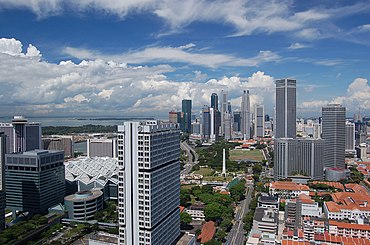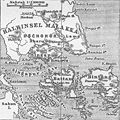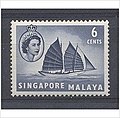Portal:Singapore
 Map of Singapore Singapore, officially the Republic of Singapore, is an island country and city-state in maritime Southeast Asia. The country's territory comprises one main island, 63 satellite islands and islets, and one outlying islet. It is about one degree of latitude (137 kilometres or 85 miles) north of the equator, off the southern tip of the Malay Peninsula, bordering the Strait of Malacca to the west, the Singapore Strait to the south along with the Riau Islands in Indonesia, the South China Sea to the east, and the Straits of Johor along with the State of Johor in Malaysia to the north.
Singapore's history dates back at least eight hundred years, having been a maritime emporium known as Temasek and subsequently a major constituent part of several successive thalassocratic empires. Its contemporary era began in 1819, when Stamford Raffles established Singapore as an entrepôt trading post of the British Empire. In 1867, Singapore came under the direct control of Britain as part of the Straits Settlements. During World War II, Singapore was occupied by Japan in 1942 and returned to British control as a separate Crown colony following Japan's surrender in 1945. Singapore gained self-governance in 1959 and, in 1963, became part of the new federation of Malaysia, alongside Malaya, North Borneo, and Sarawak. Ideological differences led to Singapore's expulsion from the federation two years later; Singapore became an independent sovereign country in 1965. After early years of turbulence and despite lacking natural resources and a hinterland, the nation rapidly developed to become one of the Four Asian Tigers. As a highly developed country, it has one of the highest GDP per capita (PPP) in the world. It is also identified as a tax haven. Singapore is the only country in Asia with a AAA sovereign credit rating from all major rating agencies. It is a major aviation, financial, and maritime shipping hub and has consistently been ranked as one of the most expensive cities to live in for expatriates and foreign workers. Singapore ranks highly in key social indicators: education, healthcare, quality of life, personal safety, infrastructure, and housing, with a home-ownership rate of 88 percent. Singaporeans enjoy one of the longest life expectancies, fastest Internet connection speeds, lowest infant mortality rates, and lowest levels of corruption in the world. It has the third highest population density of any country in the world, although there are numerous green and recreational spaces as a result of urban planning. With a multicultural population and in recognition of the cultural identities of the major ethnic groups within the nation, Singapore has four official languages: English, Malay, Mandarin, and Tamil. English is the common language, with exclusive use in numerous public services. Multi-racialism is enshrined in the constitution and continues to shape national policies in education, housing, and politics. Singapore is a parliamentary republic in the Westminster tradition of unicameral parliamentary government, and its legal system is based on common law. While the country is de jure a multi-party democracy with free elections, the government under the People's Action Party (PAP) wields widespread control and political dominance. The PAP has governed the country continuously since full internal self-government was achieved in 1959, and holds a supermajority in Parliament. One of the five founding members of ASEAN, Singapore is also the headquarters of the Asia-Pacific Economic Cooperation Secretariat, the Pacific Economic Cooperation Council Secretariat, and is the host city of many international conferences and events. Singapore is also a member of the United Nations, the World Trade Organization, the East Asia Summit, the Non-Aligned Movement, and the Commonwealth of Nations. (Full article...)Selected article -The Four Asian Tigers (also known as the Four Asian Dragons or Four Little Dragons in Chinese and Korean) are the developed Asian economies of Hong Kong, Singapore, South Korea, and Taiwan. Between the early 1950s and 1990s, they underwent rapid industrialization and maintained exceptionally high growth rates of more than 7 percent a year. By the early 21st century, these economies had developed into high-income economies, specializing in areas of competitive advantage. Hong Kong and Singapore have become leading international financial centres, whereas South Korea and Taiwan are leaders in manufacturing electronic components and devices. Large institutions have pushed to have them serve as role models for many developing countries, especially the Tiger Cub Economies of Southeast Asia. (Full article...) Selected picture The Downtown Core is a 266-hectare urban planning area in the south of the city-state of Singapore. The Downtown Core surrounds the mouth of the Singapore River and southeastern portion of its watershed, and is an integral part of the Central Area. Read more... General imagesThe following are images from various Singapore-related articles on Wikipedia.
Selected biography -Fandi bin Ahmad PBM (born 29 May 1962) is a Singaporean professional football manager and former player. He is the current technical advisor and head coach of Malaysia Super League club Sri Pahang. During his professional career, he played mainly as a striker, but also occasionally as a midfielder. Along with the Singapore FA, he also played for Malaysia Cup state sides Kuala Lumpur FA and Pahang FA, and won titles with all three, including two doubles in 1992 and 1994, as well as the Golden Boot in 1988. Fandi also played for Indonesia's Niac Mitra, Netherlands' Groningen as well as local Singaporean clubs Geylang United and SAFFC. Internationally with the Singapore national team, Fandi earned 101 caps and scored 55 goals, a record he holds today, as well as winning three Southeast Asian Games (SEA Games) silver medals while being captain from 1993 to 1997. After his retirement, he began his managerial career in 2000 by helming his former playing club SAFFC, before moving on to Indonesia's Pelita Raya and Malaysia's Johor Darul Takzim, while also serving as the assistant national coach on numerous occasions while and running his own Fandi Ahmad Academy. (Full article...) Did you know (auto-generated)
In this month
More did you know -
Selected panoramaThe Changi Beach Park (Chinese: 樟宜海滨公园) is a beach park located at the northeastern tip of Singapore. The 28-hectare Changi Beach Park is one of the oldest coastal parks in Singapore. The park is 3.2 km long with stretches of sandy beaches between Changi Point and Changi Ferry Road. Singapore topicsRelated portalsSoutheast Asia Other Countries Tasks
CategoriesWikiprojectsAssociated WikimediaThe following Wikimedia Foundation sister projects provide more on this subject:
Discover Wikipedia using portals |































































